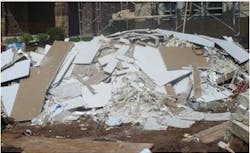Even Lean Is Local
It has been long been said that “home building is a local business” and as much as I’d like to think that Lean always transcends locality, that is not always the case. Last week during one of our LeanWeek events in Austin, Texas, the head of a drywall installation company asked about using 54-inch-width drywall—aka “stretch board”—in lieu of standard 48-inch widths for 9-foot ceilings. Nine-foot ceilings are rampant in Austin and so many other markets these days—unless of course they are 10 feet. He described how, when taping and finishing the extra joint with 9-foot ceilings and standard board, you have to use a non-machine-edge either on the wall at 8 feet or at the intersection of the ceiling and wall. So not only do you get an extra seam around the entire room, you have one that is tricky and takes more time to float out. That means extra cost for zero value-added and that is not Lean.
On this particular large single-story unit of just over 3,100 square feet, there was just under 1,200 linear feet of 9-foot wall. What’s the big deal? Aren’t the guys already there and working? What’s one more seam? Imagine taping a single joint, 8 to 9 feet in the air, the length of 4 football fields, or almost a quarter mile! And remember, one edge is machine-finish and one is not, making it more time consuming. Kind of puts that in perspective, doesn’t it? This is not a big deal … it’s a huge deal. So what about the cost to the builder?
In Austin, the quote came back at just $25/1,000 square feet more for 54-inch board. That’s more than $400 for that unit, a large house with a lot of rooms. So it’s probably no more than $200 per house for a more typical, open-plan, 2,300 square footer, but that is at the $25/1,000 premium. This just felt high to me. I know there is the issue of stacking board two-wide on trucks, but still …
So I emailed some clients and asked what they pay in their market. It was literally all over the map. One other builder was at $25/1,000, another $20/1,000, one at $16, two at $10, two at $6, several at zero premium and one where stretch board was slightly less. This builder was particularly interested. He talked to his drywall labor supplier who said he would give him a break for using 54-inch board, plus he would save on material.
So is 54-inch board Lean? At $25/1,000 it could be a tough call, but I’d sure open the conversation. Anything less than that, I’d say probably so and if more builders used it, the price would drop everywhere. Most builders wouldn’t give this a thought and since drywall is virtually always paid by the square foot for labor, the response is often “we won’t get it back,” so it does not count. But that is not Lean thinking. You do enough to help your suppliers and trades save and it does come back to you. Besides that, you get a better product and here’s another bonus: less waste. Did you figure into your equation what it costs to haul it away and bury the very stuff you paid for?
I know this from our experience with more than 100 Lean implementations, if you following the old practice of ordering 4 x 12-foot sheets in bulk because that’s how you get the best price, you are generating extra cost in labor, material and waste removal that outweigh your great price. With the cost of drywall up substantially this year, running this analysis should be a priority. Our 54-inch example is just a piece of the Lean approach, which is to design the rooms to appropriate sizes in the first place, then order and stock board sized to each area to get your yield up, labor down and waste minimized. Yes, Lean is sometimes local but measure all of the costs and Lean thinking always wins.

